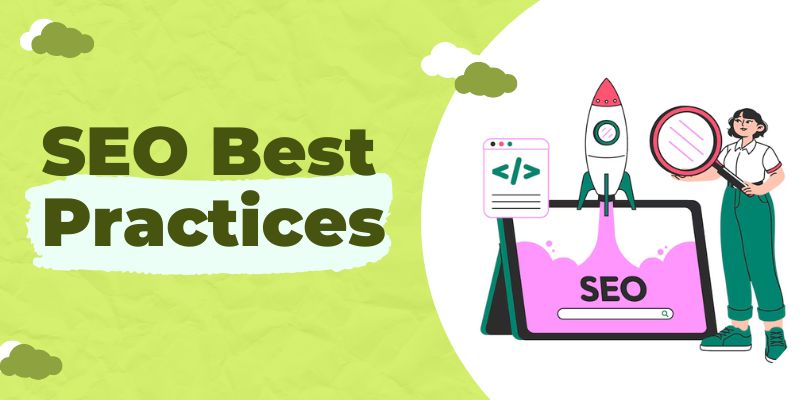Hospitality SEO Best Practices For 2025 & Beyond
Are you in the hospitality industry and looking to boost your online presence? In this digital age, search engine optimization (SEO) plays a crucial role in driving traffic to your website and attracting potential guests.

As we venture into 2025 and beyond, it's important to stay updated on the latest SEO best practices specifically tailored for the hospitality sector.
In this blog post, we'll explore the top strategies and techniques that will help you enhance your online visibility, increase bookings, and outshine your competitors.
What is Hospitality SEO?
Hospitality SEO is the process of optimizing websites and online content for hospitality-related businesses like hotels, restaurants, and travel services. The goal is to improve rankings on search engines such as Google, attract more visitors, and encourage direct bookings through the website.
Let's say someone is arranging a vacation. They look for for the "best hotels in Dubai." Hospitality SEO guarantees that your hotel's website ranks on the top page of search results, making it easier for potential visitors to find and book your services.
Best Tips to Improve SEO in 2025
Guys, here are 34 unique tips you can follow up on to improve the hospitality SEO:
- Mobile-Friendly, Fast Website
- Local & “Near Me” Keywords
- High-Quality Visual Content
- Optimize Google Business
- Write Travel Guides
- Showcase Guest Experiences
- Seasonal & Event Content
- Engaging Listicles
- FAQ & How-To Content
- Build Backlinks
- Keep Content Updated
- Social Media Sharing
- List on Travel Platforms
- Respond to Reviews
- Optimize for Voice & Snippets
- Clear Call-to-Actions
- Use HTTPS for Security
- Local Business Partnerships
- Highlight Sustainability
- Multi-Language Booking
- Chatbots for Support
- Collaborate with Influencers
- Use Schema Markup
- Highlight USPs
- Engage in Travel Communities
- Paid Ads for Keywords
- Add Booking Engine
- Track Competitor Strategies
- Loyalty Programs
- AI-Powered Personalization
- Host Local Events
- Targeted Email Campaigns
- Ensure Website Accessibility
- User-Generated Content
Let me guide you about each in detail.
1. Mobile-Friendly, Fast Website
A website should look good and work fast on phones and computers. Most people use their phones to search for places.
- Make the website easy to use on small screens.
- Fix slow-loading pages.
- Use simple menus to help people find information fast.
- Add big, clear buttons for booking or calling.
2. Local & “Near Me” Keywords
People often search for “hotels near me” or “restaurants in [city name].” Use words like this on your website.
- Add the name of your city or town to your website.
- Use phrases like “best hotel near the beach.”
- Write about attractions close to your business.
- Add keywords to blog posts, titles, and descriptions.

3. High-Quality Visual Content
Pictures and videos make your business look more attractive. People love to see how a place looks before booking.
- Show clean and beautiful photos of rooms, food, or events.
- Add videos of your hotel or restaurant.
- Use 360-degree images to give a virtual tour.
- Make sure the pictures load fast.
4. Optimize Google Business
Google Business Profile helps people find you easily on Google Maps and search. It’s free to use.
- Add your business name, address, and phone number.
- Update opening hours and services.
- Post pictures of your business.
- Ask happy customers to leave reviews.
5. Write Travel Guides
Travel guides help people learn about your area. They show that you are an expert about your location.
- Write about fun places to visit near your hotel.
- Share tips like “What to pack for the beach.”
- List activities families can enjoy nearby.
- Add maps and directions to help visitors.
6. Showcase Guest Experiences
Share reviews or stories from people who stayed at your place. New customers trust reviews.
- Post pictures or videos of happy guests (with permission).
- Share written reviews on your website or social media.
- Highlight awards or recognitions your business won.
- Thank customers for their feedback.

7. Seasonal & Event Content
Write about special times of the year or local events. This helps people plan trips.
- Create pages like “Top Winter Activities in [City Name].”
- Share offers for holidays like Christmas or New Year.
- Write about local festivals or parades.
- Post updates about weather or travel tips for the season.
8. Engaging Listicles
Listicles are fun lists that are easy to read. They help people find quick answers.
- Write lists like “5 Best Things to Do Near Our Hotel.”
- Create “Top 10 Restaurants in [City Name].”
- Share travel tips, like “3 Ways to Pack Light.”
- Use simple words and short points.
9. FAQ & How-To Content
FAQs answer common questions, and how-to guides help people solve problems.
- Answer questions like “How do I book a room?” or “What time is check-in?”
- Write guides like “How to Find Us.”
- Add a section for FAQs on your website.
- Update FAQs with new questions regularly.
10. Build Backlinks
Backlinks are links from other websites to yours. They help your business show up higher in search results.
- Ask local travel blogs to write about your business.
- Partner with nearby attractions to share links.
- Post about your business on social media.
- Link to your site from travel platforms like TripAdvisor.
11. Keep Content Updated
Always keep your website fresh and up-to-date. People like the latest information.
- Update your room prices and offers regularly.
- Add new pictures or videos often.
- Refresh blogs with new information.
- Fix old links that don’t work anymore.
12. Social Media Sharing
Social media helps you connect with people and share your business.
- Post photos of your rooms, food, or events on Facebook and Instagram.
- Share travel tips or local event updates.
- Reply to messages and comments from people.
- Use hashtags like #BestHotelIn[CityName] to reach more people.

13. List on Travel Platforms
Travel platforms like TripAdvisor or Booking.com help people find you easily.
- Add your business to popular travel sites.
- Update your profile with the right information.
- Post photos and videos on your listings.
- Respond to questions or reviews on these platforms.
14. Respond to Reviews
Reviews show what customers think about your business. Always respond politely.
- Thank happy customers for their kind words.
- Solve problems if someone leaves a bad review.
- Ask guests to leave reviews after their stay.
- Use positive reviews on your website and social media.
15. Optimize for Voice & Snippets
Many people use voice search or look for quick answers online. Make your website ready for this.
- Use simple sentences that answer questions.
- Add keywords like “best family hotel near me.”
- Write short answers for FAQs.
- Highlight important points in bold or headings.
16. Clear Call-to-Actions
Call-to-Actions (CTAs) tell people what to do next, like booking a room.
- Add buttons like “Book Now” or “Contact Us.”
- Use clear and simple words like “Check Prices.”
- Place CTAs on every page of your website.
- Make CTAs big and easy to click.
17. Use HTTPS for Security
HTTPS makes your website safe for users. Google also likes secure websites.
- Buy an SSL certificate for your website.
- Check that your website shows “https://” in the URL.
- Protect customer data like credit card details.
- Make sure all pages are secure.
18. Local Business Partnerships
Work with nearby businesses to help each other grow.
- Partner with local restaurants or tour companies.
- Share each other’s services on websites or social media.
- Offer discounts for packages like “Stay and Dine.”
- Host events together, like food festivals or workshops.
19. Highlight Sustainability
Travelers like businesses that care about the planet. Show how you are eco-friendly.
- Use solar energy or save water at your property.
- Recycle and reduce plastic use.
- Add eco-friendly messages to your website.
- Share your green efforts on social media.
20. Multi-Language Booking
Make it easy for people from different countries to book with you.
- Add multiple language options on your website.
- Use a booking system that supports different languages.
- Write welcome messages in popular languages.
- Translate important pages like FAQs and booking details.

21. Chatbots for Support
Chatbots are robots that talk to people on your website. They answer questions quickly.
- Add a chatbot to help visitors book rooms or ask questions.
- Make it answer common questions like “What are check-in times?”
- Keep it friendly and easy to understand.
- Use it 24/7 so people get help anytime.
22. Collaborate with Influencers
Influencers are people with many followers who can promote your business.
- Invite them to stay at your hotel and share pictures.
- Work with travel bloggers to write about your hotel.
- Choose influencers who share honest reviews.
- Share their posts on your social media too.
23. Use Schema Markup
Schema Markup helps Google understand your website better.
- Add code to show room prices, ratings, and availability.
- Highlight reviews and business details.
- Use tools to check if your schema works.
- This helps you appear in rich search results.
24. Highlight USPs
USPs (Unique Selling Points) are the special things about your business.
- Show what makes your hotel different, like a rooftop pool or free breakfast.
- Add these to your homepage and ads.
- Use phrases like “Only hotel with ocean view.”
- Make your uniqueness stand out in pictures and videos.
25. Engage in Travel Communities
Travel communities are groups where people share tips and advice.
- Join forums or social media groups for travelers.
- Answer questions and share helpful tips.
- Promote your business in a friendly way.
- Partner with travel communities for events or blogs.
26. Paid Ads for Keywords
Paid ads help your business appear at the top of search results.
- Choose popular keywords like “best hotel in [City].”
- Set a budget for your ads.
- Show discounts or offers in your ad text.
- Track how many people book through your ads.
27. Add Booking Engine
A booking engine lets people book rooms directly from your website.
- Add a simple and secure booking system.
- Let people see room prices and availability.
- Make it mobile-friendly.
- Allow multiple payment methods.
28. Track Competitor Strategies
Keep an eye on what other hotels or businesses are doing online.
- Check their websites and social media.
- Look at their pricing and offers.
- Find out what keywords they use in ads.
- Learn from their successes and mistakes.
29. Loyalty Programs
Loyalty programs reward guests who visit your hotel often.
- Give points for every booking.
- Offer discounts or free nights for loyal customers.
- Create a membership card for guests.
- Send emails about special offers for members.
30. AI-Powered Personalization
AI helps you give a personal touch to each guest’s experience.
- Show room suggestions based on a guest’s past bookings.
- Send personalized emails, like “We miss you!”
- Recommend activities based on a guest’s interests.
- Use AI chatbots to greet guests by name.
31. Host Local Events
Hosting events makes your hotel fun and popular.
- Organize food festivals or live music nights.
- Partner with local businesses to plan events.
- Invite guests and locals to join.
- Share pictures and videos of events online.
32. Targeted Email Campaigns
Emails help you stay in touch with your guests and attract new ones.
- Send welcome emails to new guests.
- Share offers, discounts, or travel tips.
- Personalize emails with guest names.
- Keep emails short and friendly.
33. Ensure Website Accessibility
Your website should be easy to use for everyone, including people with disabilities.
- Use large text and simple fonts.
- Add captions for videos.
- Make navigation easy for screen readers.
- Test your website for accessibility tools.

34. User-Generated Content
User-generated content (UGC) comes from your happy customers.
- Ask guests to share their photos or stories online.
- Post their pictures on your website or social media.
- Create hashtags like #StayWithUs to encourage sharing.
- Reward guests with discounts for sharing UGC.
Conclusion
In conclusion, implementing effective SEO strategies is vital for staying competitive in the ever-evolving hospitality industry. Remember, SEO is an ongoing process, so regularly monitor your performance and adapt your strategies as needed to achieve long-term success in the digital landscape of 2025 and beyond.
- ✔ Be Respectful
- ✔ Stay Relevant
- ✔ Stay Positive
- ✔ True Feedback
- ✔ Encourage Discussion
- ❌ Avoid Spamming
- ❌ No Fake News
- ❌ Don't Copy-Paste
- ❌ No Personal Attacks



